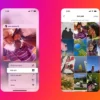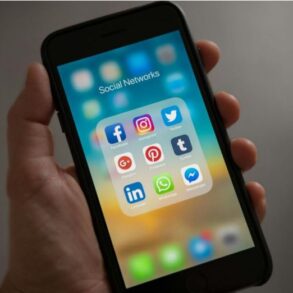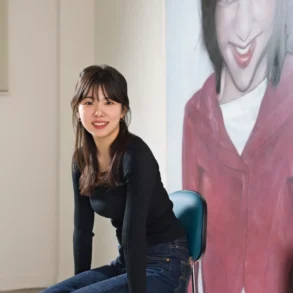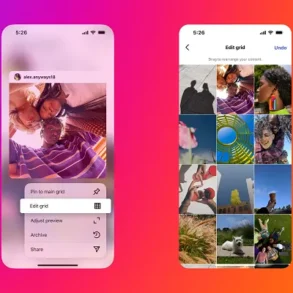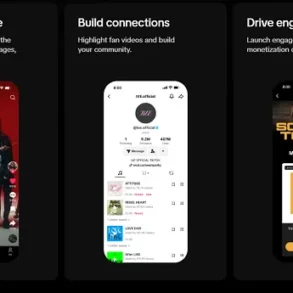Rocking out to a room full of fans is a regular night for Adelaide band Maisie, but it’s not the only stage it has to perform on.
The Kaurna-based psychedelic-rock group has been recording and releasing music since 2019 and is a regular feature in Adelaide’s local music scene.
Frontman Emmett Prime said the quality of the band’s live show was his priority, but with an industry heavily focused on social media following and streaming performance, it was hard to balance priorities.
Emmett Prime (front right) is the frontman of Maisie. (Supplied: Instagram/willmellowyellow)
“It’s a beautiful tool to expand your fanbase and even people you collaborate with,” Prime said.
“There’s so many people you can reach, but it can … take away from that creative process.”
He said the industry’s emphasis on social media following, engagement and listeners on streaming services often made him feel like it was a “waste of time” to put so much effort into the craft of performing.
“You’re judged by what your numbers are on social media, not the love and everything you put in your music,” Prime said.
“Even music labels, they care so much for social media these days they don’t really take on people who don’t have a big social media following.
“It’s not about the music anymore — it’s about what your online presence is.”
‘Pure artform’ not enough
Prime said it was not just music labels that looked to an artist’s social media when deciding who to give opportunities to, but other music organisations too.
“We’ve been knocked back from Music SA for certain things just based on our social media presence,” he said.
Emmett Prime says music labels care a lot about an artist’s online presence. (ABC News)
Maisie is one of a number of South Australian acts that told the ABC they had been rejected from industry peak body Music SA’s local festival Scouted, with social media being noted as a reason.
Scouted gives unsigned musicians the opportunity to perform for national industry representatives.
Music SA told the ABC it checked Spotify profiles, looking for “audience numbers, recent releases and up to date information” as well as playlists and links to other platforms.
Audience engagement on Instagram, promotion of current releases and use of other social media platforms “including TikTok, YouTube, any Whatsapp groups, Discord etc” were also taken into account.
Christine Schloithe says social media helps raise the profile of an artist. (ABC News: Guido Salazar)
Music SA CEO Christine Schloithe said the need for musicians to be on social media was a reality of the industry.
“There’s certainly a lot of pressure on artists to do many things and they can’t just concentrate on that pure artform anymore, which I think is a shame,” Ms Schloithe said.
“They don’t have the luxury of just being a singer and a songwriter and rehearsing and doing live performance.
“They do have to learn, particularly in the early stages, how to be their own manager, how to navigate legal contracts, how to manage the financials, how to invoice and how to build that marketing profile.”
Ms Schloithe said it was important for musicians to be digitally accessible by industry heavyweights if they wanted a chance at the “hard-won opportunity” of a slot at Scouted.
“The artist has to be able to show that they’re ready to maximise any opportunities that might come out of that, which includes a really strong media and social media presence, and for example, that is one of the criteria of being selected as a Scouted artist,” she said.
Music SA checks an artist’s Spotify profile and social media presence for its local festival Scouted. (Reuters: Dado Ruvic/Illustration/File Photo)
She described the necessity for artists at that stage to have up-to-date and engaged social media as reflective of the broader industry, who will “walk away pretty quickly” from an artist that does not have a digital platform to engage with.
“It’s also a tool that when an agency or a booker is working with you or a promoter might be thinking about working with you to build a tour,” she said.
“The social media is what they will use as a tool to raise the profile of you as an artist and literally to sell tickets to those live gigs.”
However, for some artists, spending time creating social media content with the hope that it reaches new fans or artists and repertoire representatives takes their focus away from making music.
“There’s so many songs that you don’t know you could’ve written … that you never will because you spent a certain night doing just the social media,” Prime said.
Performing on a global stage
As music discovery habits shift, Australian artists are no longer contending with other local musicians for attention, but competing in a global market with strong algorithms.
Ryan Peterson, a co-founder of music label and management Stellar Music, said it was now more difficult for smaller artists to take the next step.
“I absolutely do believe that the pressure that we’re putting on young, upcoming artists is, in the first stage of their career, absolutely greater than it ever has been and it’s really, really hard to break through,” he said.
“What has changed is that artists are now required to compete internationally from their first release as opposed to that being something that over the course of development, over an EP cycle or two EP cycles or maybe the first album that they build up to that point.”
Ryan Peterson says local musicians are competing with international artists for attention. (ABC News)
For an early-career, independent artist, knowing where to start when building an online presence can be daunting.
“For a very long time, record labels had a particular … star-making power and they essentially had a series of things that they could do to sort of press a button and if the artist was the right one they would very quickly rise through to the top,” Peterson said.
“And a lot of that star-making power has disappeared and now we’re competing creatively and competing strategically to win audience attention on the internet.”
He said while it was positive that the barrier to entry had “significantly decreased”, “cutting through that noise becomes more difficult”.
“Ultimately, if an artist wants to go on and play the mainstage at Coachella, and they want to headline Splendour in the Grass or they want to do all those big things that are reserved for the biggest artists, they are inevitably going to develop a large social media following,” he said.
This post was originally published on this site be sure to check out more of their content



